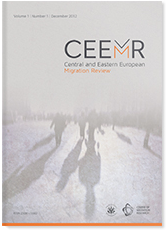‘Going to the West Is My Last Chance to Get a Normal Life’: Bulgarian Would-Be Migrants’ Imaginings of Life in the UK
‘Going to the West Is My Last Chance to Get a Normal Life’: Bulgarian Would-Be Migrants’ Imaginings of Life in the UK
Author(s): Polina ManolovaSubject(s): Migration Studies
Published by: Ośrodek Badań nad Migracjami / Uniwersytet Warszawski
Keywords: migration motivations; imaginings; East–West migration; working-class; postsocialism
Summary/Abstract: Bulgarian migration to the UK has gradually increased since the country’s EU accession and the removal of barriers to free movement of labour across the EU. The sustained popularity of the UK amongst those dreaming for a fresh start through migration, despite the hostility faced by Bulgarian immigrants, poses a paradox that cannot be explained with the ‘push–pull’ and cost–benefit calculation models prevailing in migration research. This article proposes a more balanced understanding of migration motivations on the basis of would-be migrants’ own perceptions. Drawing on biographical interviews with self-ascribed ‘ordinary people’ with long-term plans for settling in the UK, I shed light on individuals’ imaginings and expectations of life after migration. Firstly, I analyse the notion of ‘survival’ through which my informants articulated frustrations with their precarious financial situation, their inferior social and symbolic positioning within society and their inability to partake in forms of consumption and lifestyle that would allow them to experience a sense of social advancement. I then explore would-be migrants’ imaginings of life in the UK (and ‘the West’) which depict an idealised ‘normality’ of life, in which they conveyed longings for security and predictability of life, social justice and working-class dignity and respectability. These insights into people’s disappointment, desperation and disillusionment with a precarious present help us to understand the continuous construction of an ‘imaginary West’ as an ideal ‘elsewhere’, in the search of which migrants are ready to undergo hardship and stigmatisation. By engaging with the existing debates in migration studies and literature on Bulgarian migration, this article exposes the deficiencies of economic reductionism, which presents migration decision-making as a conscious, rational and calculative act and, instead, demonstrates that, very often, people are led by dreams and idealisations that are reflective of their emotions and life-worlds.
Journal: Central and Eastern European Migration Review
- Issue Year: 8/2019
- Issue No: 2
- Page Range: 61-83
- Page Count: 23
- Language: English

